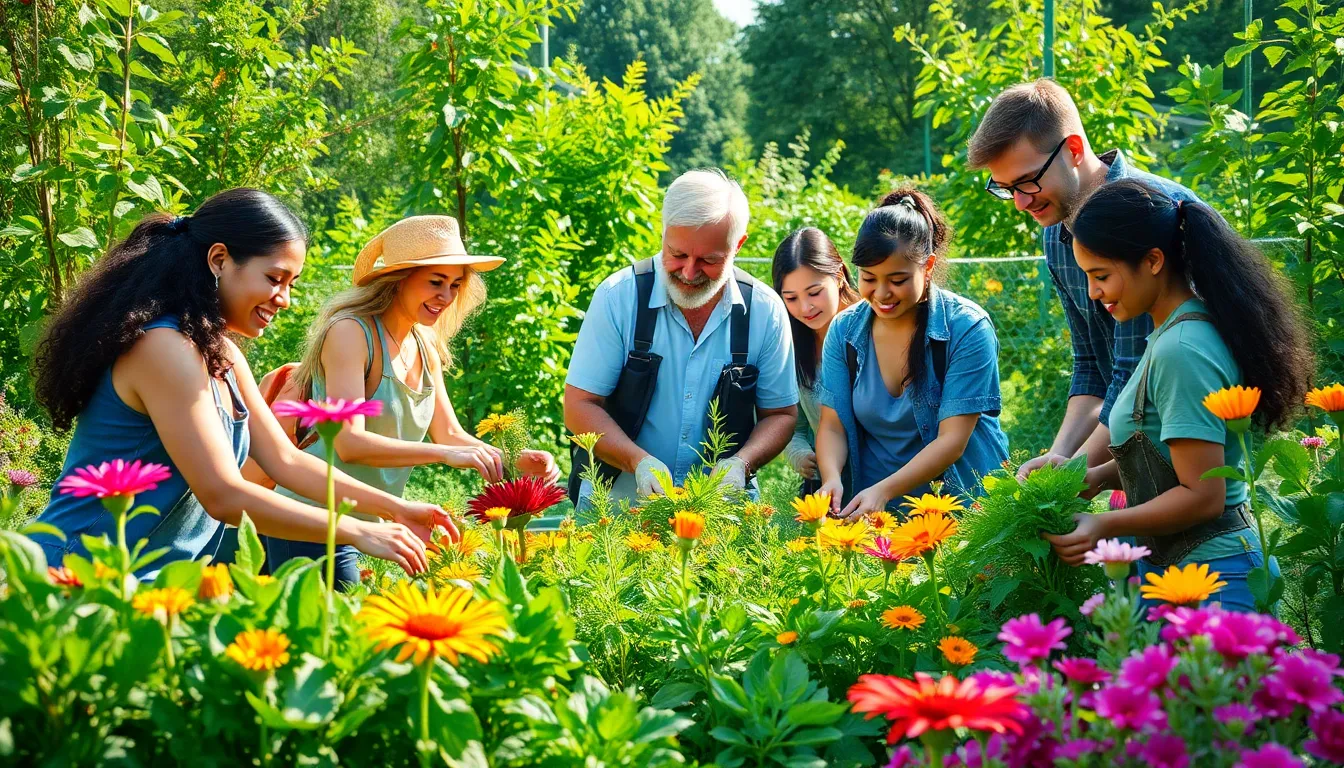Sustainable living isn’t just a trendy buzzword; it’s the superhero cape our planet desperately needs. With climate change knocking on the door and resources dwindling faster than a magician’s rabbit, embracing a sustainable lifestyle can feel like a no-brainer. It’s all about making choices that don’t just benefit today but also secure a brighter tomorrow for future generations.
Imagine a world where clean air and lush landscapes are the norm rather than a distant memory. By adopting eco-friendly habits, individuals can reduce their carbon footprint and help preserve the planet’s precious resources. Plus, living sustainably can save money and even boost health—who wouldn’t want to feel like a million bucks while saving the Earth? So, let’s dive into why sustainable living matters and how it can transform lives, one eco-friendly choice at a time.
Table of Contents
ToggleUnderstanding Sustainable Living
Sustainable living encompasses practices that reduce individual and collective environmental impact. Adopting such practices helps combat climate change and conserves natural resources. Everyday choices can significantly alter consumption patterns. For example, using reusable bags instead of disposable ones diminishes plastic waste.
Communities benefit from sustainable living through cleaner air and healthier ecosystems. Implementing green spaces, like community gardens, fosters biodiversity and provides local food sources. Engaging in sustainable transportation, such as biking or public transit, decreases carbon emissions.
The financial advantages of sustainable living are notable. Energy-efficient appliances lower utility bills while conserving power. Individuals often find that investing in sustainable products creates long-term savings, despite higher upfront costs.
Education plays a vital role in promoting sustainable living. Schools that integrate sustainability into their curricula instill environmentally conscious habits in children. Awareness campaigns further inform the public about the impacts of overconsumption and waste.
Working towards a sustainable lifestyle contributes to social justice. Communities that prioritize sustainability often address economic disparities and promote equitable access to resources. Empowering local economies through sustainable practices enhances community resilience.
Making small, consistent changes leads to larger collective impacts. Choices like reducing meat consumption or supporting local businesses collectively contribute to sustainability. By understanding the principles of sustainable living, individuals can actively participate in creating a healthier planet for future generations.
Environmental Impact

Sustainable living significantly impacts the environment by reducing human-induced damage. Practices that conserve resources and preserve biodiversity play crucial roles in this effort.
Resource Conservation
Resource conservation reduces waste, leading to lower energy consumption. Switching to energy-efficient appliances cuts electricity usage by 10-50 percent, resulting in financial savings. Utilizing reusable bags and containers minimizes plastic pollution, which harms wildlife and ecosystems. Water conservation efforts, like using low-flow fixtures, decrease overall water use. Each action, when multiplied across communities, creates substantial positive change.
Biodiversity Preservation
Biodiversity preservation sustains ecosystems that provide vital services. Protecting habitats ensures the survival of various species, maintaining ecological balance. Sustainable land use practices, such as organic farming, promote soil health and reduce chemical runoff. Planting native species supports local wildlife and enhances resilience to climate change. Enhanced biodiversity improves food security by supporting pollinators and natural pest control. Each initiative helps protect the planet’s rich biological heritage.
Economic Benefits
Sustainable living offers notable economic advantages that contribute to both individual and community prosperity.
Cost Savings
Adopting energy-efficient appliances decreases utility bills significantly. For instance, Energy Star-rated products use up to 50% less energy than standard options. Similarly, using public transportation or carpooling reduces fuel expenses over time. Moreover, individuals who grow their own food see lower grocery costs and enjoy fresher produce. Implementing water-saving techniques like low-flow fixtures leads to substantial reductions in water bills as well. Financially conscious consumers who prioritize second-hand purchases also save money while minimizing waste.
Job Creation
Sustainable practices can stimulate job growth within various sectors. Renewable energy industries, such as solar and wind, employ thousands and continue to expand. Green building initiatives generate jobs in construction and retrofitting, focusing on eco-friendly techniques. Furthermore, local farmers markets support jobs in agriculture and encourage community engagement. Companies prioritizing sustainability often enhance their brand loyalty, leading to expanded market opportunities and job openings. Fortifying the local economy through sustainability creates a robust, resilient workforce that benefits everyone involved.
Social Responsibility
Sustainable living embodies a collective commitment to the planet and its inhabitants. It connects individuals to broader social responsibilities that enhance communities and safeguard future generations.
Community Well-Being
Community well-being flourishes through sustainable practices that improve local environments. Clean air and accessible green spaces contribute to public health, fostering a sense of belonging. Sustainable living encourages cooperation among residents, whether through community gardens or local clean-up events. These initiatives not only beautify neighborhoods but also create strong social ties. Enhanced community resilience emerges from shared goals, which leads to happier, healthier populations. As individuals engage in eco-conscious activities, they inadvertently uplift one another, cultivating a supportive and thriving community.
Future Generations
Future generations depend on current actions for a sustainable world. Choices made today in reducing waste and conserving resources create a legacy of environmental stewardship. Responsible consumption now influences the availability of resources and clean environments for children. Education around sustainability nurtures awareness among youth, equipping them with knowledge to continue these practices. Communities that prioritize eco-friendly policies ensure that the next generation enjoys a balanced ecosystem. Empowered by valuable lessons in sustainability, these future leaders can innovate solutions to ongoing environmental challenges.
Sustainable living represents a vital shift toward a healthier planet and society. By adopting eco-friendly practices individuals can contribute to significant environmental improvements while enjoying personal benefits. This approach not only fosters economic growth through energy efficiency and local initiatives but also nurtures community ties and social responsibility.
The choices made today will shape the world for future generations. Embracing sustainability empowers individuals to take part in a collective effort that ensures a balanced ecosystem and equitable resource distribution. Every small action counts and collectively leads to transformative change that enhances both individual well-being and the health of the planet.



